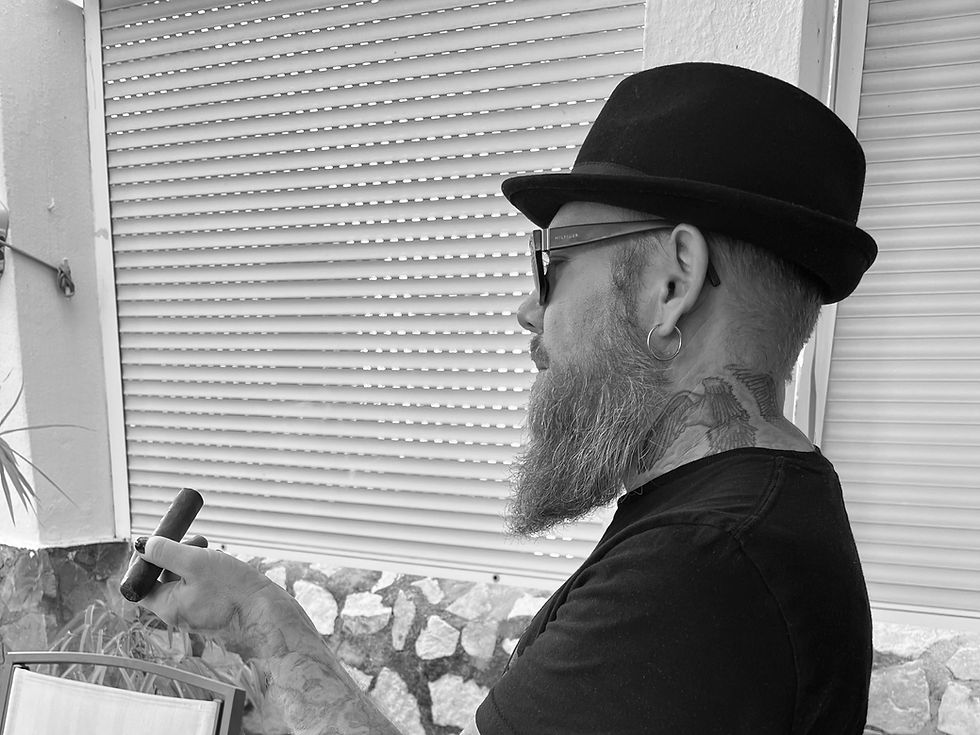Can AI really master your music the right way?
- nicolaslinnala
- Jul 7, 2025
- 3 min read
Updated: Jul 14, 2025
Can AI really master your music the right way?
There was this one time I was over the moon – we were filming a TV show at my studio, and I was in front of the camera. We were setting everything up with the crew, getting ready to roll. I was so nervous my hands were shaking – and not just a little.
Everything was “ready”, music goes on – and nothing. Silence. The sweat kicks in. I start checking cables and gear one by one, but nothing. I’m thinking, this is it. Nothing’s working.
I call a quick time-out and in a split second I see it – Thunderbolt cable is unplugged from the interface. I plug it in real smooth, open a few random programs to make it look like I’m doing something, and boom – it works. Let me tell you, that wasn’t the first or last time this happened.
But back to the point.
What does the future sound like?
AI meets music – and the studio evolves with it.
Join the mailing list and stay on track with the change.
Everyone’s offering mastering services these days
Right now, the internet is packed with automated mastering services. You Google “mastering service” and it spits out pages of results. My own listing doesn’t even show up on the first pages anymore.
These services usually work like this: you upload your track and get back a “mastered” version – maybe even at the right LUFS level. But what’s really going on behind the scenes?
Most of these services run on pre-built algorithms based on genre. So no, they’re probably not using actual AI – more like automated signal chains. If they were using true AI, the results might be better. Maybe.
AI mastering isn’t convincing – at least not yet
I tested a few of these services. The results? Not terrible, not great. Good enough for Spotify, maybe. But there was no feeling – and that’s the whole point.
Compare that to a real human doing the mastering, and it’s still no contest. But sure, a lot of people are fine with the machine version – and then wonder why no one listens to their music. E-mastering is also dragging prices down, but it still doesn’t replace real know-how.
And what if you’re mastering AI-generated music?
If the track is AI-generated and the vocals have a bit of that digital "glitchiness", you're in trouble. Mastering only makes that stuff more obvious. Mixing AI music is a whole other world – I’ve done it, and it takes serious time to learn.
But once you understand how that world works, you can absolutely make it sound better. Still, it takes time and a good ear. Not just a button.
Izotope Ozone 11 – AI as a tool, not the boss
I’ve used Izotope Ozone 11 for mastering. It’s a solid tool – and I mean tool. Used right, it saves time, but it doesn’t make decisions for me.
I hit the Learn button, and in 5–10 seconds it opens up seven plugins with basic settings. Often, they’re a decent starting point. Sometimes they miss the mark. But either way, it speeds up the process. Way faster than doing it all manually.
This is where AI shines – as a helper, not a decision-maker.
A good tool costs money – and it should
The basic Ozone version starts around 200€, the advanced one goes over 400€. But for me, it’s been worth every cent. Still, it doesn’t master the song for me – it just helps me do it better and faster.
Compete on quality, not on price
Let’s talk money. Competing with a service that offers unlimited mastering for 10€/month is tough. But here’s the thing – those who are happy with whatever comes out of that machine aren’t your clients.
Instead, compete with feeling and quality. With sound that sticks. Not with an algorithm that makes everything average.
Interested in AI, music, and studio work?
In my blog, I write about how AI is changing music production and reshaping studio work.
If these topics spark your curiosity, join the mailing list – you’ll get notified as soon as a new post is out. No spam, just the good stuff.
PS. If you like what I do and want to support or just vibe a bit more, check out my shop page – there’s shirts, samples and other sound stuff straight from the studio.





Comments